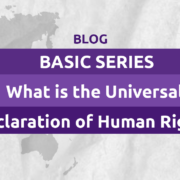How are International Treaties created?
International treaties are one of the sources of the International Law prescribed in Article 38 of the Statute of the International Court of Justice and regulated in the Vienna Convention of the law of treaties. These are international sources that are written, which means that they are normative, and, therefore, are considered by many as a more effective tool of International Law. We have already explained about treaties here.
To talk about their creation, first we need to understand how countries incorporate International Law into their domestic law. They can be characterized as monist or dualist
The dualist countries are the ones that see the rules of International Law as a different sphere, entirely isolated from the Domestic Law. Thus, for an international rule to come into effect, it must go through a process of incorporation. On the other hand, for the monist countries, the international and domestic system derive from each other, they are connected. Therefore, when an international rule is approved, it automatically comes into effect in the domestic law.
Brazil is a dualist country and consequently, the ratification of a Treaty isn’t enough so that an international rule comes into effect nationally. For a Treaty to really work domestically, it must go through the process known as incorporation. We will explain it in more detail below.
Process of creation of an International Treaty
The process of creating an International Treaty can be divided into four parts: negotiation and signature, incorporation, ratification, and passage. It is an international custom that the Executive Branch is competent to conclude a treaty. In Brazil, the Office of the General Counsel for the Federal Government is responsible for the continuation of a Treaty. Generally, the whole process of creation takes time, as consensus among all parties is needed for its approval.
Negotiation
Those responsible for negotiating a treaty are known as the plenipotentiaries agents, they are representatives of the Executive Branch involved in this phase of creating a treaty.
Even if this representative is part of another Branch, he does so on behalf of the Executive. For example, if a Brazilian Supreme-Court justice concludes a treaty, he will be representing the Executive Branch, even though he was originally part of the Judiciary Branch.
The negotiation is the moment of discussion and production of the text of the treaty. Before the negotiating assembly, a PREPICON takes place, which is when the agents study the subject addressed by the treaty. The final text can be unanimously approved or by two-thirds, this depends on each treaty and is also defined at the time of the negotiation. It is important to note that, in the international scene, the more countries join an international treaty, the greater is the legitimacy of the document.
The treaty is signed when the text is approved. After that, there are two different processes. In monist countries, the signature already makes the document valid in Domestic Law. The dualist countries, however, as is the case of Brazil, must go through the phase of incorporation, since the rules don’t have domestic legitimacy yet. Even so, the signature of the treaty already binds the State to the international agreement, and the Brazilian Congress can’t change its text during the process of incorporation.
Incorporation (dualist countries)
After the authentication of the treaty, the dualist countries can’t instantly bind the text to their rules. For such, it is necessary that the Brazilian Congress participate in the process of incorporation in the Domestic Law.
The Constitutional Amendment No 45, of 2004, considerably changed the status in which the treaties are incorporated in Brazil.
The decrees of incorporation of the treaties that were approved before the Constitutional Amendment No 45, in 2004, have the status of supra-legal.
After the amendment, for treaties that don’t deal with Human Rights, the decree has the status of statutory law, which is the same as the status of laws elaborated by the Legislative branch and established in the Brazilian legislation, as are the laws of the Civil code, Criminal, among others.
The decrees on Human Rights treaties approved after the Amendment No 45 will have the status of Constitutional Amendment if they have a supermajority quorum (three-fifths) for the approval, that is, they have superiority over all rules of the Brazilian Law, the same as the statutory laws. If approved, but didn’t reach the supermajority quorum, but only the majority quorum, they will have the status of supra-legal.
To understand a rule that has the status of supra-legal, it is necessary to understand that legal rules have a hierarchy position among each other, so that those at the top bind those below. The Brazilian Federal Constitution is at the top of this pyramid, binding all the complementary laws, statutory laws, decrees, resolutions, etc. Therefore, having a status of supra-legal means that the rule is above the laws and below the Constitution in that binding force pyramid, so that all other legal rules, except the constitutional ones, must respect it.
Ratification (international)
The ratification is the moment to show the approval of a treaty. If possible, it is in this phase that the reservations regarding the Treaty are made, when the State signals which are the articles that weren’t approved in the domestic sphere. It happens in three phases: narrative, deliberation and corroboration
The State makes a history of participation in the treaty, known as narrative. Then, we add to this document the proof of approval by the Brazilian Congress, a moment called deliberation. Finally, the Head of State signs the document to reaffirm the commitment to the treaty, thus the corroboration takes place.
Generally, the ratification documents are stored at the UN, as it is an organisation with international public faith.
Promulgation
With the promulgation, the treaty comes into effect in domestic territory. In the case of Brazil, if a treaty (that doesn’t deal with human rights) is promulgated domestically and then another domestic rule deals with the same subject, but with a different aspect, that rule, despite considerable theoretical and jurisprudential differences, may repeal the treaty. The domestic rule has the same hierarchy as a Treaty. If this happens, Brazil needs to make a complaint saying that it can no longer comply with the treaty.












Leave a Reply
Want to join the discussion?Feel free to contribute!